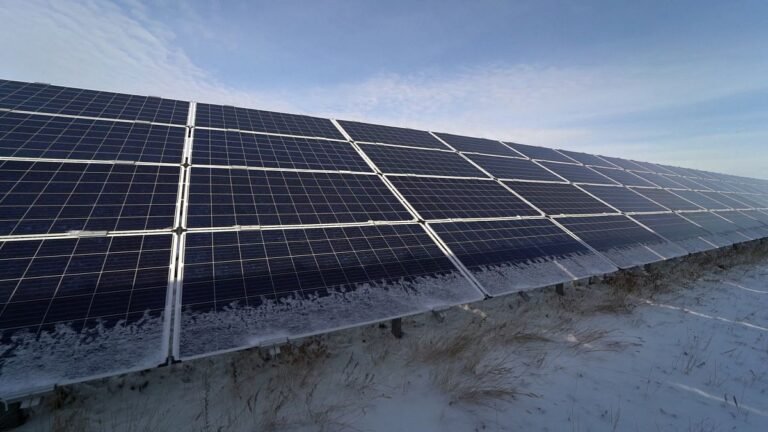With climate, energy security and jobs at risk, Europe is seeking to revive its solar industry.
Europe is trying to get rid of its dependence on Russian gas by promoting the renewable energy industry, especially solar energy.
Solar energy is seen as crucial to Europe’s energy security, climate goals, and jobs. Europe installed a record 41.4 GW of PV capacity in 2022 – an increase of 47% compared to 2021 – according to industry group SolarPower Europe.
But China now dominates the solar industry.
Figures from the Paris-based International Energy Agency predict that up to 95% of the solar industry could be concentrated in China by 2025.
Burghausen, Germany is home to Wacker Chemicals, one of the world’s leading manufacturers of polysilicon – the raw ingredient for solar panels.
“We are really what we call an energy-intensive industry,” Tobias Brandis, president of Wacker Polysilicon, told Euronews. “You have to imagine that here, at our second site in Saxony, we use about 0.7 to 0.8% of Germany’s electricity demand, which is quite huge.
“For future investment, it will be critical to have a competitive level of power, but also to have a predictable level of power,” he added.
While Wacker is one of the leading European manufacturers of polysilicon, the vast majority of it is produced elsewhere in China.
“China has taken real action there. They have considered this to be one of the industries that is going to be very strategic and they have invested very strategically in this industry,” Tobias Brandis explained.
He added, “Europe, and the same actually applies to the United States, competed not only in speed, but also in terms of production conditions, for example.”
As part of its broader strategy to address this problem, the European Union established the Solar Alliance, which brings together companies and stakeholders to increase production capacity, encourage investments and diversify supply – and create a made-in-Europe industry.
Speaking at the launch, EU Commissioner for the Internal Market Thierry Breton spoke of the “green paradox”, where solar energy is essential for decarbonisation and energy independence but where Europe is too dependent on China.
The single market facilitates European cooperation to increase industrialization. Freedom of movement allows companies across the value chain to work together – strengthening Europe’s solar industry.
Recycling solar panels: a daunting task
In the city of Grenoble in southeastern France, French startup ROSI is tackling the other end of the solar energy chain – recycling.
The rise in the number of solar panels installed over recent years will be reflected by a rise in the number of panels that will soon reach the end of their lifespan. This represents a major challenge for the recycling industry.
“We will be able to recycle up to 3,000 tons of solar panels, that is, about 100,000 panels that can be recycled every year,” Antoine Chalot, General Manager at ROSI, told Euronews.
He revealed, “But tomorrow it will not be enough to recycle 3,000 tons. We will have to recycle tens of thousands of tons because the flow of waste in France will continue to grow.”
This results in a significant increase in the number of solar panels across Europe that will soon need to be recycled.
ROSI has developed a method to extract the most valuable elements from solar panels – silicon and silver – using pyrolysis to separate the different pieces. The sorting process separates the photovoltaic cells from the glass, and chemical washing separates the silver.
ROSI is also working on expansion, with a factory opening soon in Lamour.
Alongside the single market, Europe sees sustainable innovation like this as a way to become more resilient and globally competitive.
“Recycling is an area in which Europe excels and Europe continues to be a leader in this field,” explained Antoine Chalot. “If we are to rebuild an efficient photovoltaic industry in Europe, on a large scale, recycling these materials will make our industry more competitive.”
With climate, energy security and jobs at risk, it is important that Europe can revive its solar industry.





